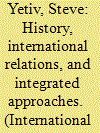|
|
|
Sort Order |
|
|
|
Items / Page
|
|
|
|
|
|
|
| Srl | Item |
| 1 |
ID:
105231


|
|
|
|
|
| Publication |
2011.
|
| Summary/Abstract |
This essay starts by exploring how history can contribute to the discipline of international relations (IR). It then moves beyond this question to explore a broader question, beyond IR and history, with which this symposium is concerned: how can we enhance interdisciplinary analysis in international studies? With regard to the first question, this essay advances several themes. First, while history can serve IR in several ways, it is especially salient to the study of change in IR. Second, the study of history can help us connect the dots across time in ways that can complement IR. Stringing detailed cases together or examining the broader sweep of a longer time period may help us discern causal connections that would have been buried in more streamlined and short-term analyses. Third, history can aid in theory-building, modeling, and testing in the study of IR. Quantitative approaches can also benefit from in-depth historical studies. In assessing the value of history to IR, however, it is critical to ask what type of historians and IR scholars we are considering and to be aware of the differences among them. Fourth, while it is useful to draw on history for IR, history also has its limits and may be misused. At the core, this essay examines how history can contribute to IR, but that analysis raises a broader question: how can we integrate notions and insights from various disciplines in international studies, including history and IR? This essay advances one schema for doing so, which it calls "integrated approaches." It demonstrates one type of integrated approach for the study of foreign policy behavior. The approach systematically draws on multiple disciplines to explain behaviors such as decisions to make treaties, go to war, or ally with other countries.
|
|
|
|
|
|
|
|
|
|
|
|
|
|
|
|
| 2 |
ID:
076986


|
|
|
|
|
| Publication |
2006.
|
| Summary/Abstract |
Balance of power is a ubiquitous concept in theory and practice, but it is rarely tested. This study tests balance of power and balance of threat theories in the case of U.S. intervention in the Persian Gulf. Propositions are derived from the theories and from a conceptualization that treats external states as facing potentially competing and contradictory pressures to balance at the global and regional levels as well as against power and threat. Evidence strongly disconfirms balance of power theory, while balance of threat theory is partly confirmed. Conditions are identified that make balance of threat theory more robust against the historical period explored and possibly in other cases.
|
|
|
|
|
|
|
|
|
|
|
|
|
|
|
|
|
|
|
|
|